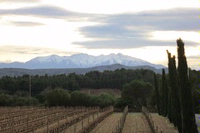They say that confession is good for the soul, so here goes: I confess that I’ve never been convinced of the virtues of organically or biodynamically grown wines. I have tasted many delicious ones, to be sure, but that never convinced me for the following reason: One can never know how much of the deliciousness of an organically grown wine derives specifically from its having been grown organically.
That may seem confusing, but it is actually easy enough to understand. On one hand, there’s no doubt in my mind that a grower who decides to forego chemical pesticides, herbicides and fertilizers in favor of organic treatments has chosen a responsible and conscientious path. But, on the other hand, people who are responsible and conscientious tend to act that way in  almost everything they do. Consequently, it is highly likely that a conscientious grower is also a conscientious winemaker: He or she probably keeps an immaculate cellar, uses all of the best practices, and works very hard to optimize the wine made from the vineyard’s fruit.
almost everything they do. Consequently, it is highly likely that a conscientious grower is also a conscientious winemaker: He or she probably keeps an immaculate cellar, uses all of the best practices, and works very hard to optimize the wine made from the vineyard’s fruit.
So, how can we tell what the specific contribution of organic growing practices may have been when tasting a particular wine made by this person? The fact is…we can’t.
With that said, however, it isn’t true that we’re totally in the dark about the advantages of growing grapes organically. For example, if one tastes really vast numbers of wines made with organically grown grapes, that certainly enhances the likelihood–if not the certainty–that the growing practices are making a contribution to quality (however great or small). Moreover, if wines sourced from organic vineyards show higher quality in difficult growing seasons (marked by drought, for instance), then it would be reasonable to conclude that a healthier vineyard was better able to cope with a challenging vintage, and that the vineyard was probably healthier because of organic growing.
Additionally, if one found no higher-than-normal correlation between organically grown wines and problematic characteristics (such as botrytis in dry wines), then there would be good reason to believe that any benefit derived from organic practices need not be purchased at the price of problems in your glass. Even if we were to stipulate for purposes of argument that all benefits of organic growing were solely environmental and not vinous (meaning, the earth was healthier but wine quality was unaffected), wouldn’t that still be worth something to you? Finally, wouldn’t that be worth more than just a little if you also knew that buying an organically grown wine was also heightening your odds of buying a bottle that was conscientiously made in other respects as well?
If the foregoing thoughts make me seem like someone who has undergone a conversion experience of sorts, that’s exactly right. Earlier this year, I attended Millésime Bio, a “world organic wine fair” in Montpellier, France. This trade show included 689 different exhibitors,  which is pretty damned impressive even before we address the fact that the average quality of the wines being poured was very, very high.
which is pretty damned impressive even before we address the fact that the average quality of the wines being poured was very, very high.
I will soon have a full column up on Wine Review Online to report on my findings from the trip. When you have a chance to read it, you’ll see some reporting that may surprise you. For example, you may find it remarkable–as I did–that excellent wines are being made from organic grapes not only in arid regions where organic practices are relatively easy to follow, but also in places like Germany, Switzerland, Slovenia, Austria, Champagne, Alsace, and even notoriously damp locations such as Muscadet, Rias Baixas and Sauternes.
Check back in three weeks to see the full column. I think you’ll be impressed–as I was.
1
